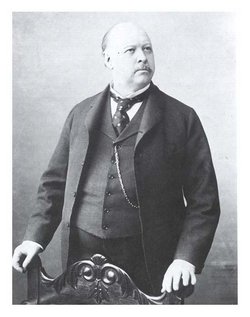Thomas Brackett Reed (1839-1902)

Reed was first elected Speaker after an intense fight with future President William McKinley, then a Congressman from Ohio. Reed gained the support of young Theodore Roosevelt, whose influence with the newly elected delegate from the Dakota territories was the decisive factor. Reed served as the Speaker of the United States House of Representatives from 1889 to 1891 and then from 1895 to 1899, as well as being Chairman of the powerful Rules Committee.
During his time as Speaker, Reed assiduously and dramatically increased the power of the Speaker over the House; although the power of the Speaker had always waxed (most notably during Henry Clay's tenure) and waned, the position had previously commanded influence rather than outright power. Reed set out to put into practical effect his dictum that "The best system is to have one party govern and the other party watch"; this was accomplished by carefully studying the existing procedures of the U.S. House, most dating to the original designs written by Thomas Jefferson. What followed has popularly been called the "Battle of the Reed Rules".
In particular, Reed sought to circumscribe the ability of the minority party to block business, by way of its members refusing to answer a quorum call, thus forcing the House to suspend business. This is popularly called the disappearing quorum. As Speaker, Reed's solution was as controversial as it was simple: when a quorum call was announced, Reed began counting every member present in the chamber, whether they chose to answer the roll call or not. Reed's intent was simple: to enable the majority party to make decisions that the minority could not block by parliamentary maneuver.
Neither party was convinced of the need to streamline House procedure, but the Democrats had the most to lose as the minority party. The parliamentary intrigue and back room infighting was heated and at times threatening. Reed's cunning and Cannon's technical skill won out. His changes paved the way for the Speakership of Joseph Gurney Cannon, who is generally regarded as the most powerful Speaker of the United States House of Representatives.
<< Home